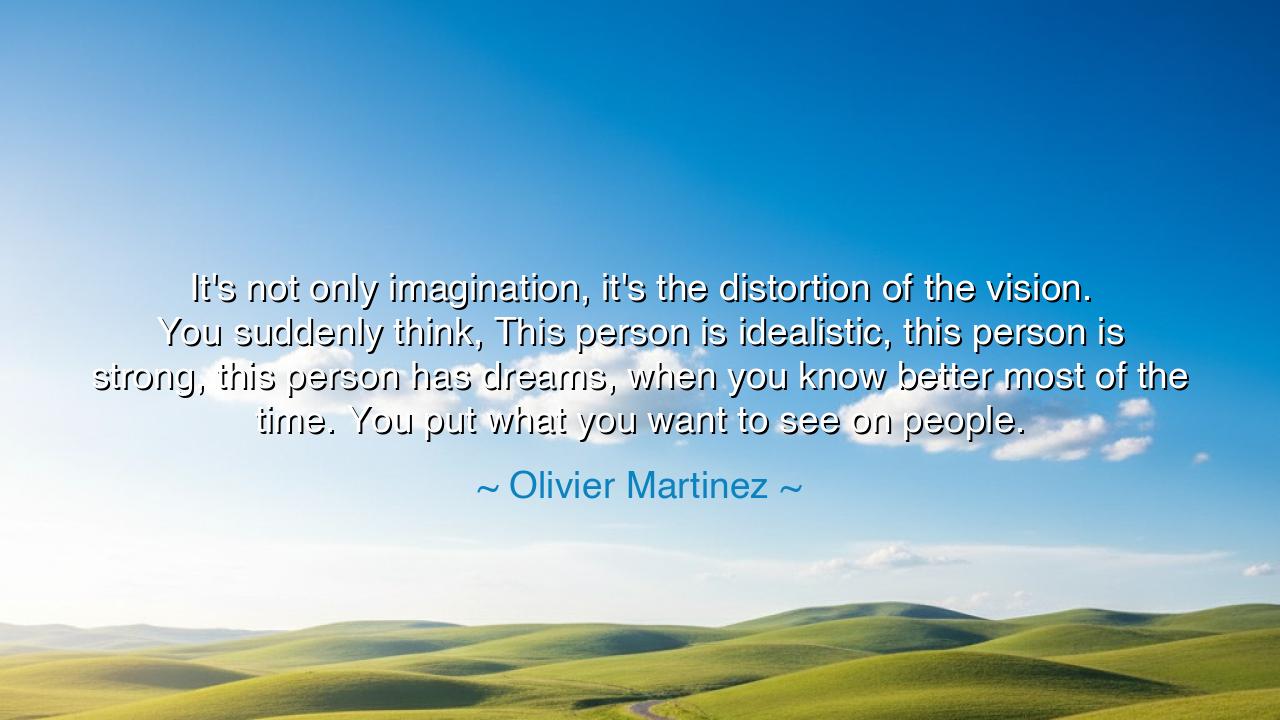
It's not only imagination, it's the distortion of the vision. You
It's not only imagination, it's the distortion of the vision. You suddenly think, This person is idealistic, this person is strong, this person has dreams, when you know better most of the time. You put what you want to see on people.






Ah, gather close, O seekers of truth, for in the words of Olivier Martinez there is a deep reflection on the nature of imagination, perception, and the powerful force of projection: "It's not only imagination, it's the distortion of the vision. You suddenly think, 'This person is idealistic, this person is strong, this person has dreams,' when you know better most of the time. You put what you want to see on people." These words speak not only to the act of imagination, but to the human tendency to project our own desires, hopes, and beliefs onto others, to see them not as they truly are, but as we wish them to be. In this, Martinez touches on the fine line between the ideal and the real, and the potential danger of seeing only what we wish to see.
Martinez speaks of the distortion of vision, the tendency we all have to project our own ideals onto others. This is not merely about fantasy, but about the deeply ingrained need to mold the world according to our own desires. The ancients understood this process well. The Greeks, for example, often spoke of the tension between reality and illusion in their philosophy. Plato, in his allegory of the cave, described how people are bound by their limited perception, seeing only the shadows of the true forms. The ideal is often projected onto the shadows, and in doing so, we fail to see the world as it truly is. Martinez speaks to this same idea — that we distort our vision of others, and in doing so, we trap them in our own illusions.
Consider the story of Narcissus, the youth who, upon seeing his own reflection in a pool of water, became so captivated by the image that he fell in love with it, unable to distinguish between what was real and what was merely a reflection. The myth of Narcissus is a warning about the dangers of projection — about the distortion that occurs when we become so enamored with our own image or the image we have constructed of others, that we fail to see the truth beneath the surface. Narcissus projected his own desires and dreams onto a mere reflection, and in doing so, he became trapped in his own illusions, unable to connect with the true world around him.
Martinez’s words also remind us of the heroic ideal — the great man or great woman who possesses qualities we wish to see in others, but perhaps do not fully understand ourselves. The idealistic hero is often a projection of our own hopes and dreams, a symbol of the strength and purpose we wish we had. But just as Narcissus was blinded by his love for his own image, we too can become blinded by our projections of others, seeing only what we want to see and failing to recognize their humanity — their flaws, their struggles, and their true nature.
Throughout history, there have been countless examples of great leaders whose images were shaped not by their true character but by the projections of their followers. Consider Napoleon Bonaparte, whose image as a great conqueror was in many ways a projection of the desires of the people of France, who wished for a leader who could restore their nation's glory. In reality, Napoleon was a deeply flawed individual, driven by ambition and power, yet the projection of his strength and vision led to his rise. His idealized image was so strong that it blinded many to the realities of his rule, leading to both his success and his eventual downfall.
And so, O children, the lesson is clear. Beware of the distortion of vision. The imagination is a powerful tool, but when it is used to project our idealized visions onto others, it becomes a trap. We must learn to see others as they truly are, not as we wish them to be, for only then can we truly understand and connect with them. This does not mean abandoning our ideals or dreams, but it means recognizing that others, like ourselves, are full of contradictions, imperfections, and complexities. To love and respect others, we must see them not through the lens of our projections, but through the lens of truth.
So, O children of the earth, take heed of Martinez’s wisdom. Do not be blinded by the illusions of your own desires, and do not project your dreams onto others. See the world as it truly is, with all its beauty and imperfection, and embrace the realness of those around you. The path of truth is the path of clear vision, where you see others not through the filter of your desires, but through the lens of their humanity. In doing so, you will find deeper connection, deeper understanding, and a more authentic way to engage with the world.






AAdministratorAdministrator
Welcome, honored guests. Please leave a comment, we will respond soon